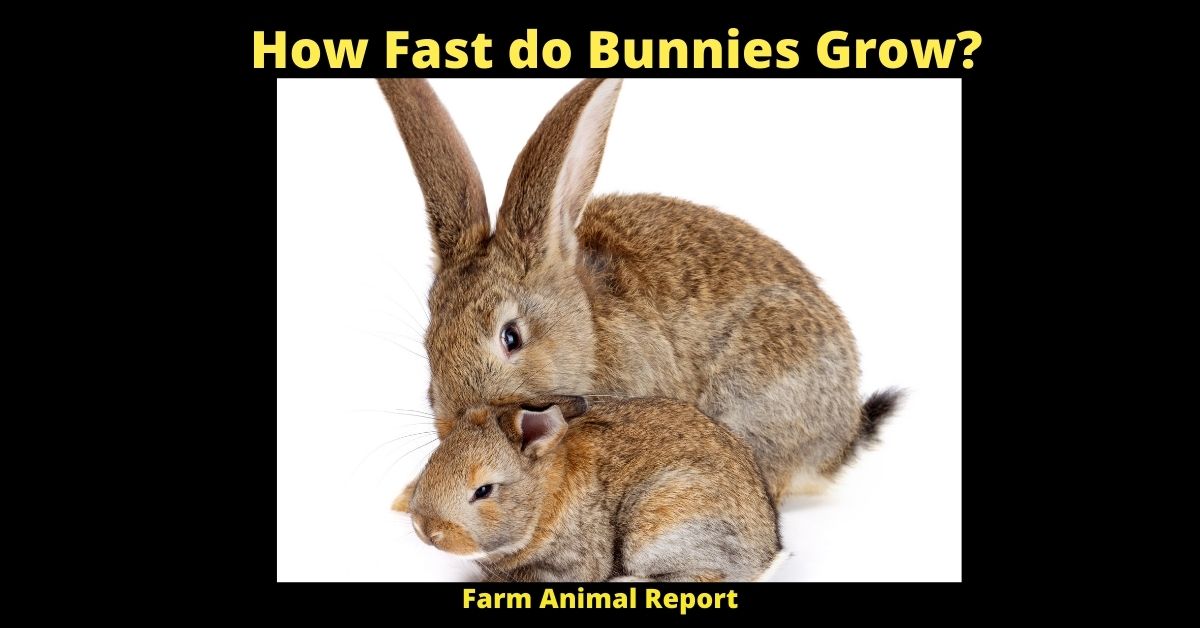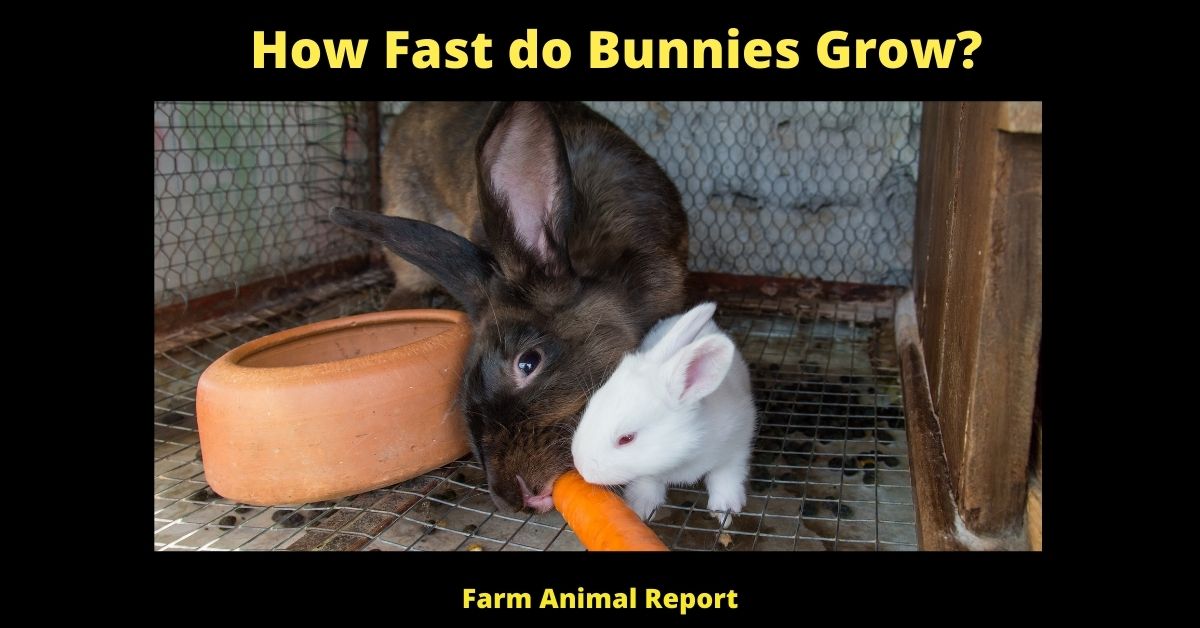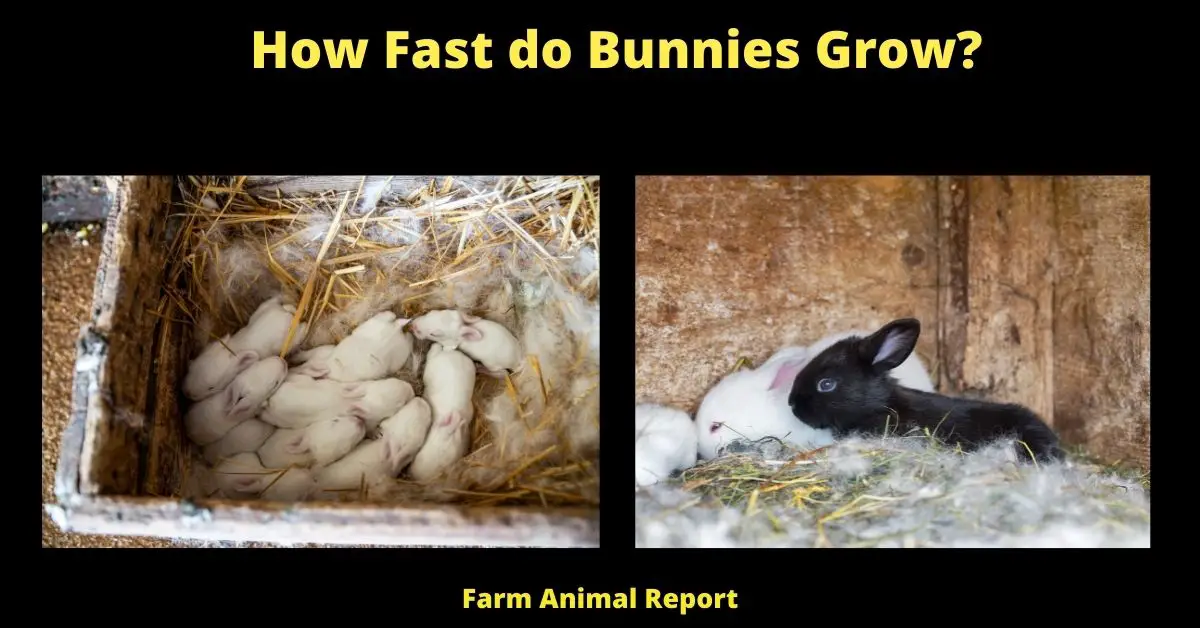Different rabbit breeds grow at different rates, but most reach maturity within 6-10 months. For example, small pets like Netherland Dwarfs need only 4 – 5 months to mature while large Flemish Giants can take 18 months or more before reaching their full size!
How Fast do Bunnies Grow?
Rabbits are a popular pet choice for many people. They are known for being playful and loving, and they can provide hours of entertainment. But one question that often comes up is: how fast do bunnies grow? In this blog post, we will answer that question and give you some other interesting facts about rabbit growth rates! How Fast do Bunnies Grow? Jump To 18 Ways to Make Money by Rabbit Farming **CHARTS**

What Factors Influence How Fast a Bunny Grows?
The major factors that influence growth in a rabbit are:
- Breeds – Each breed of rabbit is different, so they have different growth rates. Some breeds grow faster than others, as well as larger and smaller than other rabbits.
- Sex – Male rabbits are usually heavier than female rabbits at the same age, but females mature more quickly.
- Age – Rabbits grow fastest during their first year of life, then slow down after that for several years until they reach maturity (which takes about two years). They may continue growing slowly into adulthood if given enough food and exercise!
- Climate/weather conditions can also affect how fast a bunny grows by affecting its appetite or metabolism rate which will lead to changes in weight over time.
- Diet – Rabbits need a good balance of protein, carbs, fat and water to grow at their fastest rate possible. If they eat too much or little than what’s needed then it may not only slow down growth but also cause health issues such as obesity which can lead to other problems later on in life like arthritis (joint pain) & heart disease!
- Health – The quality of food being fed affects how fast rabbits grow because better-quality food contains more nutrients that help them develop properly from head-to-tailbone and build strong bones muscles ligaments tendons joints etc… They should never be deprived when it comes time for meals since this could cause stunting due poor nutrition leading some serious long term effects both mentally physically that would last their
- Free Range – Rabbits are indoor pets and should be kept in cages or hutches that provide enough space for them to move around, even though they might spend most of their time there.
- Grass – Rabbits can eat grass hay if it’s available but only as long as it hasn’t been fertilized or sprayed with pesticides because these chemicals could harm the rabbit.
- Water – Water is essential for all living things including rabbits which means they need plenty on hand at all times without fail because dehydrated animals will
- Exercise – Rabbits need exercise to keep their bones and muscles strong which helps them grow at an appropriate rate for their age.
- Care – A rabbit’s environment can affect how fast they grow because if it’s too cold, hot or wet outside then they might not get enough food due low appetite resulting in stunted growth.
- Play and Socialization – Like many other mammals, rabbits are social creatures that need stimulation from interacting with other living beings (including humans).grow at their full potential but also live longer healthier lives!
- Quality of Life – You can give your rabbit a higher quality of life by providing it with fresh food water daily exercise through play socialization just like any other pet or human being would require in order for their health needs met long term success.
- Love – Rabbits are very loving animals and thrive off affection which means they will love you back unconditionally if given enough attention time spent together bonding over shared interests hobbies experiences etc…
What is the Average Weight for the Major Rabbit Breeds?
- Angora – Between two and four pounds
- Belgian Hare – Between three and six pounds
- Britannia Petite – Less than one pound
- Checkered Giant – Five to eight pounds
- Dutch – Four to six pounds
- English Lop – Between five and nine pounds
- French Lop – Between four and nine pounds
- German Angora Rabbit- Three to seven pounds
- New Zealand White – Up to four kg (about nine lbs)
- California – Usually weigh between two and four pounds when fully grown.
- German Lop – Weigh an average of four to six pounds, but can grow as large as 12 pounds.
- English Angora – Bunnies of this breed usually weigh about two to four pounds.
- Netherland Dwarf – These bunnies are the smallest on average, weighing in at one to two pounds.
- Rex Rabbit– The Rex rabbit is a bit bigger than the Netherland Dwarf, typically weighing two to four pounds.
- Mini-Lops – Adult mini lops should weigh between five and six pounds.
- Florida White – Florida Whites are a small rabbit that weighs about two to three pounds on average.
- Silver Marten Rabbit – Silver Martens generally reach four to seven pounds when fully grown.
- New Zealand Red– They usually weigh around 12 lbs, but can max out at 15 lbs!
- New Zealand White Rabbits– New Zealands are slightly smaller than the Reds, weighing in between eight and twelve pounds.
- German Angora Rabbit- Three to seven pounds (standard size) Dwarf: 0½ – ½ lb., Giant: up to 12 lbs.) This domestic rabbit breed is also known as “the cuddly” due to its thick coat of fur
- Polish – Generally weigh about four to six pounds.
- American – Bunnies of this breed typically weigh four to eight pounds.
- Flemish Giant – Mainly they weigh between 12 to 15 pounds. The largest of them all is a Flemish Giant that weighed 23.75 pounds and had more than three feet in length!
- Continental Giant – Between 11 lb (minimum) and 22 lb(maximum)
- Chinchilla Rabbit- They usually weigh about seven to nine pounds when fully grown.
- Mini Rex – Adult mini rex rabbits typically weigh about five or six pounds, although the standard for show bunnies is four to six pounds. New Zealand rabbit
- Jersey – Weigh between 12 to 15 pounds
- Cinnamon – Usually weigh about five to six pounds.
- Lilac – Their average weight is nine and a half pounds when they reach adulthood.
- Silver Fox – Average weight is eight to ten pounds.
- Champagne D’Argent – Can weigh up to nine lbs, but most weigh between five and seven pounds.
- Himalayan Rabbit– They usually grow from four to six lbs when fully grown!
- Lionhead Rabbit- They are quite small rabbits with a maximum average of three pounds so they can easily be held in your arms!
- Netherland Dwarf – These bunnies are the smallest on average, weighing in at one to two pounds.
- Continental Giant – Between 11 lb (minimum) and 22 lb(maximum)
- British Giant– These rabbits usually weigh somewhere around 18–22 lbs., with males being larger than females.
Check Out Amazon for Resources about Breeding Rabbits
What are the Growth Phases of Rabbits?
The growth Phases of Bunnies are:
- Newborns – 0-14 days
- Juvenile – 29 days to sexual maturity (around four months)
- Weaned – 16-28 days
- Maturity – They reach sexual maturity at around four months old
- Seniors – Bunnies can live up to twelve years, but the average lifespan is eight. They reach sexual maturity at four months of age and have an average litter size of five kittens per year. Babies are weaned at 16-28 days old and reach puberty when they are about six months old. Rabbits start showing signs

What kind of Diet do Bunnies need to Grow Quickly and Healthily?
Next, you need to make sure that your bunny is eating the right kind of food. There are many different types of rabbit food on the market, but not all of them are good for your pet. Make sure to get a high-quality diet specifically designed for bunnies. These diets will help your pet grow quickly and stay healthy.
In addition to a quality diet, be sure to give your bunny plenty of fresh vegetables and fruits. Bunnies love carrots, apples, and other crunchy treats. Just make sure not to overfeed your pet – too much sugar can be bad for their health!
The Rabbit diets consist of the following Percentage of Nutrients:
– 16.0% crude protein
– 22.0% crude fiber
– Calcium 0.60%, Phosphorus 0.50%
– Sodium 0.15%, Potassium 0.70%
– Magnesium 0.025%, Iron 160 ppm, Copper 15 ppm, Zinc 120 ppm, Manganese 12 ppm
– Selenium Yeast 0.30 mg/kg diet as an added source of selenium
What is Best Diet for Pet Bunnies? Rabbits Diet in Captivity
For Pet Bunnies to maximize growth and prevent obesity – the diet should contain 16-18% of crude protein, no more than 20% of crude fiber and less than 0.50% calcium. The diet should also provide a minimum of 0.025 magnesium, and be supplemented with selenium yeast at a rate of 30 mg/kg diet.
What Diet is Best for Meat Rabbits /
Meat Rabbit’s best diet is concentrating on growth and taste, the diet should contain 22-25% of crude protein, no more than 15% of crude fiber and less than 0.50% calcium. The diet should also provide a minimum of 0.025 magnesium, and be supplemented with selenium yeast at a rate of 30 mg/kg diet.
What Diet is Best for Fur Rabbits
Fur Rabbit’s best diet for optimal coat growth and quality should contain 16-18% of crude protein, no more than 20% of crude fiber, and less than 0.50% calcium. The diet should also provide a minimum of 0.025 magnesium, and be supplemented with selenium yeast at a rate of 30 mg/kg diet.
What is the Best Diet for Free Range Bunnies
The main part of the free-range bunnies diet is grass this should be supplemented with pellets, vegetables, and fruits. The diet should contain 16-18% of crude protein, no more than 20% of crude fiber, and less than 0.50% calcium. The diet should also provide a minimum of 0.025 magnesium, and be supplemented with selenium yeast at a rate of 30 mg/kg diet..
Are there any Health Risks Associated with Rapid Bunny Growth Rates?
Some of the important health issues that will stunt growth are:
- Poor diet – A diet that is low in fiber and high in sugar can cause health problems for any bunny, but it can be especially harmful to growing bunnies
- Malnutrition – This occurs when the bunny does not get enough of the nutrients it needs to grow.
- Dental problems – If a bunny’s teeth are not growing and wearing properly, it can cause pain as well as difficulty eating.
- Infection – An infection of any kind in the body
- Environmental stressors – Stress can cause growth to slow down and even stunt.
- Parasites – Parasites can rob the bunny of essential nutrients, leading to stunted growth.
- Snuffles – is a serious respiratory disease that can cause stunted growth
- Hairballs – Hairballs in growing bunnies typically occur when the bunny is young and its digestive system is not yet fully developed.
- Uterine tumors – These tumors can cause infertility and even death in female rabbits.
- Myxomatosis – is a serious, highly contagious disease that can cause stunted growth and death even in vaccinated bunnies.
- Stomach sludge – This is a build-up of food and other matter in the stomach that can cause health problems, including stunted growth.
- Calicivirus – is a highly contagious virus that can cause stunted growth
Final Thoughts – How Fast do Bunnies Grow?
Different rabbit breeds grow at different rates, but most reach maturity within 6-10 months. For example, small pets like Netherland Dwarfs need only 4 – 5 months to mature while large Flemish Giants can take 18 months or more before reaching their full size!





